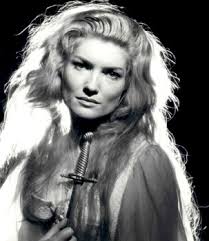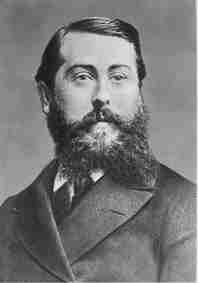|
SATURDEE OPRY LINKS 52:
Quasi-Delibes Edition



Mady
Mesple
Sabine Devieilhe
Leo Delibes
Saturdee Opry Links Overture!
"Lakme," by Leo Delibes
https://www.youtube.com/watch?v=R5zDBhNokws
1.
In a public square in a town in India, Lakme has been ordered by her father to
sing sings the legend of the pariah's daughter. The legend: a girl is walking
through the forest at night and comes upon a stranger who has been set upon by
wild animals. She rings a magic bell that is on her wand and saves the man, who
is actually Vishnu, the son of Brahma the Creator. Vishnu takes her up to
paradise for saving him. (If only!)
Here is the enchanting "Bell Song," or "Air des Clochettes," from "Lakme," by Leo Delibes,
enchantingly sung by soprano Sabine Devieilhe.
https://www.youtube.com/watch?v=gMO0KFL3E58
Translation:
http://www.aria-database.com/translations/lakme02_bell.txt
SPOTLIGHT:
Leo Delibes was the son of a mailman and a musician. Lucky for us, he was not
inspired to deliver mail. He was not a "major composer," in the generally
accepted sense, yet how does that apply when he wrote twenty operattas and comic
operas (two of which are lost) two operas, and several ballets. Tchaikovsky
pronounced him greater than Brahms, but then, Tchaikovsky hated Brahms. "Lakme"
is his greatest work, and the "Bell Song" and "Flower Duet" have become standard
vocal repertory (and, alas, "top 40" programming for demographically pandering
stations such as KUSC.)
https://www.britannica.com/biography/Leo-Delibes
2.
In a garden surrounding a secret temple in India, Lakmé wanders, notices that
the world seems quite different and wonders why. (Never suspecting that the
culprit is love!) Here is soprano Mady Mesple with the dreamy "Pourquoi dans les
grands bois" ("Why do I love to wander in the grand woods?") from act one of "Lakme,"
by Delibes.
https://www.youtube.com/watch?v=bwG28Sr__yo
About Madame Mesple, who was still with us, as of this writing, at 86.
https://en.wikipedia.org/wiki/Mady_Mespl%C3%A9
Translation:
In my heart now I feel there's a murmur so strange
The flow'rs are more lovely appearing,
And Heaven's more radiant now.
From woods a new song I am hearing.
Fonder zephyrs caress my brow.
And a fragrance that's rare is filling,
All my senses with a rapture so thrill-
ing-
Why love I thus to stray,
In woods here, day by day,
While tears have sway ?
Why doth the dove's note sadden.
And fill my heart with sighing;
As doth a fading flow'ret,
Or a leaf earthward flying?
Yet are these tears most sweet to me,
Tho' sad they be I —
And my heart is gladsome,
Tho' I'm sighing, I'm gladsome,
Ah! why?
Why look for reasons here, in the
song of the stream,
Where roses dream ? —
In leaves that fall around ?
In my heart soft reposes, like a lily at
rest.
Sweeter balm than yield roses, by
gentle winds caressed.
Or by loving lips pressed. Tho' I
sigh, I'm gladsome.
Ah! why?
3.
In the same secret garden at at Hindu temple, Gerald, an officer of the British
army, also wonders why he is full of mysterious feelings (never, again, once suspecting
the culprit is love!) Here is Spanish tenor Alfredo Kraus with "Fantasie aux
divins mensonges" ("Where do these supernatural feelings come from?") from "Lakme,"
by Delibes. All the arias in this opera, and duets, etc., seem cut from the same
ethereal cloth.
https://www.youtube.com/watch?v=HSK9z7QrHWg
Translation:
But whence cometh this dread super-
natural feeling.
Thrilling my soul to its depths,
And strange fancies revealing?
Here, 'mid this solemn calm profound,
Daughter of my caprices,
The unknown one now meets mine
eyes.
Her voice unto me whispers softly
A word of mystic power.
Cheating fancy coming to mislead me.
With the song that the siren sings
Back to dreamland, with thy joys de-
nied me,
O fancy bright, with golden wings,
O fancy bright with thy golden wings \
Hence! Hence! back to dreamland,
thou light misleading,
O cheating fancy with golden wings
{Takes bracelet.)
Some snowy arm this round enclosing,
fi'en now, I see, arm so divine!
Fair little hand, would 'twere repos-
ing
As oft in thee, softly in mine I
{Takes a gold band.)
This golden band, fancy divining. . .
SPOTLIGHT:
About "Lakme." (Even the tragically deprived folk who ignore Saturdee Opry Links
love a duet from this opera, and don't even realize it.)
https://en.wikipedia.org/wiki/Lakm%C3%A9
4.
You wonder if composers went to the trouble of using the term, "comic opera"
partly because most operas are not? Delibes' gorgeous "Lakme" is a simple story
of unrequited love, and yes, it ends very badly. Good old poison is the remedy!
When Lakme realizes that Gerald has placed his military duty above his love for
her, she nibbles on a nasty datura leaf, and sings this aria, ""Tu m'as donné le
plus doux rêve" ("to me the fairest dream thou hast given.") Here again is
Madame Mesply.
https://www.youtube.com/watch?v=ziEUMNQRSRs
Translation:
To me the fairest dream thou'st given
That soul can have beneath our skies ?
Stay and end this dream, so like
Heaven,
Away from hating mortal eyes.
Here whisper'd words of love were
spoken.
That Hindu hearts have never
known.
Their gaze Iiath met love's tender
toxin,
On the cheeks press'd by thee alone !
Press'd by thee alone ! Ah !
To me the fairest dream thou'st given
That soul can know beneath our skies !
Stay and end this dream, so like
Heaven,
Away from hating mortals' eyes !
Far away from cruel eyes !
5.
But back to the beginning of "Lakme," when things were much happier. One wonders
if Delibes ever wrote another melody approaching this one, and that it might be
yet hiding in one of his largely forgotten comic operas. It is of such inspired
delicacy and beauty that you wish you had never heard it before---in order that
you could, once more, hear it for the first time. Today, one must fight mental
images from car, perfume, jewelry commercials---and criminal repetition by the
likes of such stations as KUSC---to get to its purity. Perhaps this video,
showing the young sopranos Sabine Devieilhe and (mezzo) Marianne Crebassa
recording it with great love, restores some of the freshness. This is, of
course, the "Flower Duet." Here, Lakme, daughter of a Brahmin priest, and her
servant, Mallika, gather flowers by a river.
https://www.youtube.com/watch?v=C1ZL5AxmK_A
Translation:
https://en.wikipedia.org/wiki/Flower_Duet
6.
Here is a transporting, rather tonally exotic item. . .From Ravel's song cycle,
"Sheherazade," this is the ode, "Asie" ("Asia"), a heady, intoxicating
rhapsody---sung (again, in a recording session), by French mezzo-soprano
Marianne Crebassa. Some kind of gem. (Funny that you hear hints of a theme Ravel
used in "Rhapsodie Espagnole" here and there.)
https://www.youtube.com/watch?v=zpcBR4ugYf0
Translation:
https://sites.google.com/site/edwardlein/Home/translations/ravel-klingsor-sheherazade-english-translation-
7.
Is there a sadder story than that of composer Henri Duparc? Is there a sadder
song than his "Chanson Triste?" ("Sad Song.") Poor Duparc.From Wiki:
A mental illness, diagnosed at the time as "neurasthenia", caused him abruptly
to cease composing at age 37, in 1885. He devoted himself to his family and his
other passions, drawing and painting. But increasing vision loss after the turn
of the century eventually led to total blindness. He destroyed most of his
music, leaving fewer than 40 works to posterity. In a poignant letter about the
destruction of his incomplete opera, dated 19 January 1922, to the composer Jean
Cras, his close friend, Duparc wrote:
“Having lived for 25 years in a splendid dream, the whole idea of [musical]
representation has become – I repeat to you – repugnant. The other reason for
this destruction, which I do not regret, was the complete moral transformation
that God imposed on me 20 years ago and which, in a single minute, obliterated
all of my past life. Since then, [my opera] Roussalka, not having any connection
with my new life, should no longer exist."
And the poor devil lived to be 85.
Here, again, is wonderful Marianne Crebassa with "Chanson Triste."
"And from your eyes so full of sadness,
From your eyes I will then drink
So many kisses and so much tenderness
That perhaps at last I will be healed."
https://www.youtube.com/watch?v=9RrTo2gJxIo
Translation:
http://www.lieder.net/lieder/get_text.html?TextId=34985
8.
Well, how do you follow such sadness? Oh, boy. That's it---"Oh, Boy," an album
by Marianne Crebassa consisting entirely of "trouser roles"---male roles sung by
females. So here is decidedly more upbeat fare, "Voi Che Sapete" (you know the
melody) from "Le Nozze de Figaro." (Which, of course, means "Figaro's Nose.")
From Crebassa's "Oh Boy" album.
Cherubino, a young page in the Count's service, arrives in the Countess's
bedroom wearing his new military uniform, and sings
a plea to women to see how much love he has to give.
https://www.youtube.com/watch?v=mOvYfZol82k
Translation:
http://www.aria-database.com/search.php?individualAria=222
Oh, Boy! (The album.)
https://www.amazon.com/Oh-Boy-Marianne-Crebassa/dp/B01J2MEC9Q
About Ms. Crebassa:
http://www.mariannecrebassa.com/
9.
Here is an early version of "All You Need is Love." Well, sort of. For the
durability and age of this particular sentiment, one would think humanity would
be better off, but. . .Anyhow, this is "Amour viens rendre à mon âme," or "Love,
fill my soul." You know, Trump sings this every morning when looking in the
mirror. (Sorry for the disturbing image.) From "Orpheus and Eurudice," by Gluck,
here, again, is the superb Marianne Crebassa.
https://www.youtube.com/watch?v=pdceid3YhS8
Translation:
Love, fill my soul with your most ardent flame!
For this love, I shall brave even Death.
Though Hell should stand in my way,
The monsters of Tartanus hold no terrors for me.
I feel love's power in my breast,
and for this love I shall brave Death itself
About the opera:
https://en.wikipedia.org/wiki/Orpheus_and_Eurydice
FINAL BOW:
Back to one of two fabuleux French sopranos featured today (and they are easy on
the eyes, as the obnoxious expression goes), here is Sabine Devieilhe (no, I
have no idea how to pronounce the last name) with the beloved "Doll Song" from
"Tales of Hoffman" by Jacques Offenbach. Also known as "Les oiseaux dans la
charmille" ("The birds in the hedges"), this piece is so difficult as to be
almost a caricature of coloratura singing.
Summary: Olympia is a life-sized doll devised by Spalanzani the mad inventor,
and she quite beguiles Hoffman while singing this paean to love.
Translation:
http://www.aria-database.com/search.php?individualAria=364
https://www.youtube.com/watch?v=r_njjdDYnfo
About Ms. Devieilhe:
https://en.wikipedia.org/wiki/Sabine_Devieilhe
https://www.theguardian.com/music/2017/nov/16/sabine-devieilhe-mirages-cd-review-tharaud-les-siecles-roth-erato
Back to Opera Links
Back to Home Page
|



